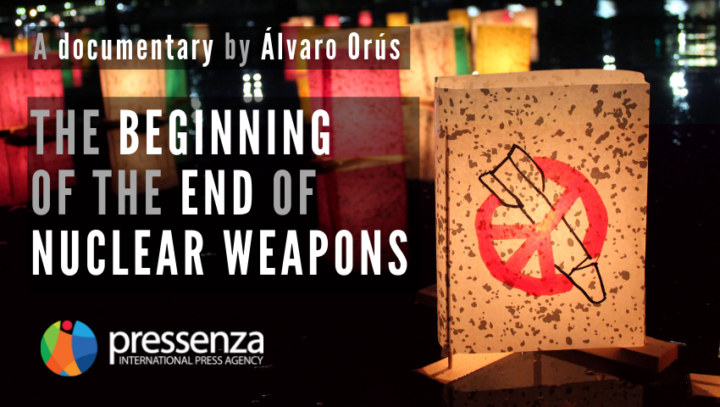- The launch coincides with the 3rd anniversary of the date on which the UN agreed on the text of the Treaty on the Prohibition of Nuclear Weapons (TPNW)
- The documentary is available in 10 languages
- 12 more countries are required to ratify the TPNW in order for it come into force
“On the 7th of July 2017, 122 countries voted in favour of the Treaty on the Prohibition of Nuclear Weapons. Countries that don’t have nuclear weapons, but live under their threat, voted for a ban. Without the knowledge of most of their citizens, the governments of the world’s nuclear powers didn’t vote, and yet the ban went ahead. Something new is happening.”
Thus begins the documentary that charts the history of the nuclear age over the course of 56 minutes; from the first tests in the Nevada desert, to the 7th of July 2017 when the text of the TPNW was approved.
Through the testimonies of 14 civil society activists, politicians and diplomats, some of whom were absolutely key in bringing the treaty to life, together with the photographic and video material contributed by dozens of artists around the world, not only is the need to eliminate nuclear weapons underlined and reiterated as a threat to human survival today, but a path for anyone to get involved and do their bit to help eliminate nuclear weapons is explained.
“If you have a bank account, you can do something about nuclear weapons,” said Susi Snyder from the Don’t Bank on the Bomb Campaign, which pressures financial institutions to divest from nuclear weapons.
Director, Álvaro Orús, and producer Tony Robinson, worked together over the course of almost a year to record interviews in Madrid, New York, Toronto, Utrecht and Geneva in order that the documentary could help raise awareness of the Ban Treaty, especially in those countries of NATO whose governments are staunchly opposed to eliminating nuclear weapons, but also in those non-nuclear weapon states whose ratifications will be crucial to bring the treaty rapidly into force. Currently the treaty counts on 81 signatories and 38 ratifications.
The Treaty will change the landscape when it comes to the security discussions around nuclear weapons.
Tony Robinson said, “The five permanent members of the UN Security Council (USA, Russia, China, France and the UK) have been happy to remain in the architecture of the old and stagnant Nuclear Non-Proliferation Treaty because they have been able to use it to justify their lack of concrete steps towards multilateral nuclear disarmament ever since 1970. Year after year states refer to the NPT as the cornerstone on which all discussions on nuclear disarmament should be based, but this treaty enshrines the ‘inalienable right’ of nations to develop nuclear technology for peaceful means, such as nuclear energy, which is frankly absurd given the costs and risks involved.”
“The TPNW is an evolution in international law, making nuclear weapons illegal for all, not just for some,” he added.
As Beatrice Fihn, executive director of the Nobel-Peace-Prize-winning International Campaign to Abolition Nuclear Weapons, ICAN, says so eloquently in the film, “You can’t have an apartheid law that treats people or countries differently. You have to have the same rules for everyone, otherwise it’s inconsistent and it’s not going to work.”
The year 2020 marks the 75th anniversary of the bombs dropped on Hiroshima and Nagasaki.
Anyone wishing to watch this award-winning film online can no do so from Pressenza’s various YouTube Channels. Links to the different language versions can be found below.
Links can also be found from the film’s website: www.theendofnuclearweapons.com
The specially written and recorded soundtrack for the film by David Bazo is also available online.
For any enquiries, contact: Tony Robinson tony.robinson@pressenza.com
English: https://youtu.be/qzWyYuYLxlM
Catalan: https://youtu.be/yy0xqiXQk8o
Czech: https://youtu.be/fHXM9wyKMmU
French: https://youtu.be/M7ghPHSW7R8
German: https://youtu.be/JKx-AAaMay0
Greek: https://youtu.be/CfmyHAE3Z10
Italian: https://youtu.be/Z0Rg1UJ3xpg
Japanese: https://youtu.be/u64k53JeEHM
Portuguese: https://youtu.be/i0F2L5JDoak
Spanish: https://youtu.be/inaJXv4PWoU
Swedish: https://youtu.be/smG01UvlAGM






